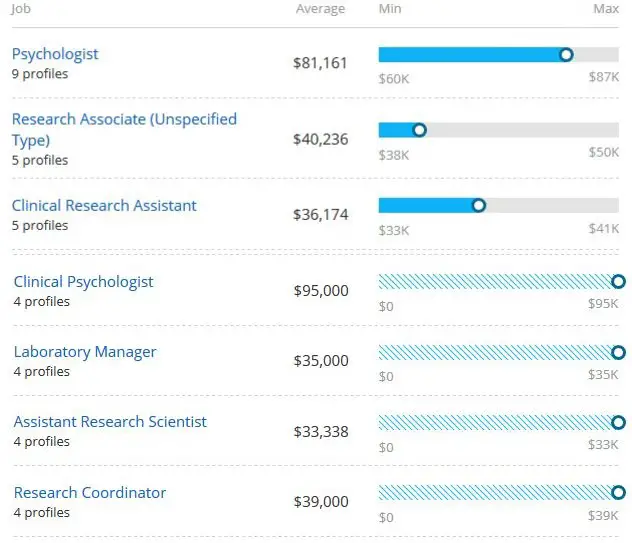How to become a Psychologist
This article provides in-depth information into What is a Psychologist? What Psychologists do? Degrees for Psychologists, Steps to become Psychologist and much more.
A psychologist is someone who has at least an undergraduate degree in psychology, which is the study of the brain in terms of human behavior and personality. Becoming a psychologist allows you to work in various working environment and in a variety of settings with individual patients, businesses, hospitals, clinics, schools, prisons, communities, the government, the military, and many others. Most psychology professions require an advanced degree, such as a master's or a doctorate. To work, a psychologist must be licensed at the state or national level.
What does a Psychologist do ?
Psychologists investigate human behavior, delving into how people think, how they learn, and how they develop emotionally and socially. They use a wide range of methods to conduct research on large groups, specific populations, and individuals.
-
Provide effective individual, family and group psychotherapy.
-
Working with clients to help them make changes to their behavior through a variety of psychological therapies.
-
Identifying and diagnosing mental, behavioral or emotional disorders.
-
Administering psychological tests and assessing the results.
-
Developing treatment plans.
-
Determine realistic goals for psychotherapy.
-
Perform psycho-diagnostic evaluations.
-
Supervise staff, fellows, and interns.
-
Attend program development for patients treated or evaluated.
-
Demonstrate an understanding of patient needs when devising and implementing treatment.
-
Provide team consultation.
-
Conduct scientific studies of behavior and brain function.
-
Conducting research through interviews, surveys, and observations.
-
Test for patterns that will help them better understand and predict behavior.
-
Use their knowledge to increase understanding among individuals and groups.
Steps for becoming a Psychologist
1
Earn A Bachelor’s Degree
Psychologists often start by earning a bachelor’s degree in psychology. Prerequisite courses include general psychology, experimental and developmental psychology, and statistics.
2
Gain Experience While In School
If you’re interested in experimental psychology, help a professor with her research project. Work with handicapped children, if you’re interested in developmental psychology. Volunteer in a mental health clinic, if you’re interested in clinical or counseling psychology. If you get hands-on experience during your psychology degree, you may find it easier to find a job after school.
3
Get Master’s Degree
Most psychology fields require a master’s degree, although doctorates are often necessary for clinical psychologists, and medical degrees are typically required if you want to be a psychiatrist. Learn about the various programs to find the psychology master’s degree that’s best for you. The school you choose will depend on your interests and the specialties of the faculty at the schools you’re considering.
4
Complete Doctorate Degree
Most fields of psychology require a doctorate. A Ph.D. is the traditional psychology degree which places an equal emphasis on research and clinical training. PhDs in psychology are offered by traditional universities and are highly competitive. Psychology graduate schools look for a competitive score on the GRE (1200 or more), a GPA of 3.3 or higher, and volunteer or paid experience in the field.
5
Do A Psychology Internship
States normally require you to do a two-year supervised internship. This is a good idea for many reasons: you get on-the-job training; you learn whether a certain specialty is right for you, and you get the satisfaction of helping others. Internships in clinical and counseling psychology may need to be approved by the American Psychological Association (APA) because jobs in mental health sometimes require an APA-approved internship.
6
Get Licensed
All states require you to fulfill certain requirements before they’ll grant you a license. You must also pass a national exam and, in some cases, present a case study to a board of psychologists.
Psychologist Degree Levels
Associate
Associate degrees typically take two years to complete and are offered at community colleges and career schools. While an associate degree isn’t likely to land graduates a job in the field, it will provide an overview of basic theories and principles within psychology and often these credits can be transferred to a four-year program.
Introduction to Psychology
-
Biological Psychology
-
Psychoanalysis Perspective
-
Behaviorism Perspective
Objectives
-
Explaining the history of the field
-
Discussing current theories
-
To study the origins and variations in human behavior
Research Methods
-
Introduction to Quantitative Analysis
-
Surveys and Experiments
-
Introduction to Research
Objectives
-
Creating an experiment
-
Analyzing data
-
Writing clear reports
Developmental Psychology
-
History of developmental psychology
-
Theoretical and research perspective
-
Neo-Freudian perspectives
Objectives
-
Evaluating the main psychological theories’ applicable to human development
-
Analyzing and interpreting how people change at various stages in their lives
Bachelors
Students can earn two types of bachelor’s degrees: a Bachelor of Arts (BA) or a Bachelor of Science (BS). Both degrees cover the basic concepts of psychology before branching off into differing studies. BS programs, however, are geared toward students who are more interested in science, are planning to earn a graduate degree in the field, or want to attend medical school. BA programs are often offered at liberal arts institutions, allowing students with diverse academic interests to take classes from other disciplines. A BA in psychology is attractive to students interested in fields beyond psychology, such as business or marketing, and those who do not plan on pursuing graduate studies in the field.
Statistics
-
Regression
-
Probabilities
-
Sampling Distribution
Objectives
-
Using statistical reasoning
-
Gaining proficiency in data analysis
-
Introduction to concepts in probability
Biological Psychology
-
Exploring the Nervous System
-
The Development and Plasticity of the Nervous System
-
The Biology of Emotion and Stress
Objectives
-
Describing brain structures and how the brain develops
-
Understanding links between brain systems and behaviors or emotions
-
Describing neurological disorders
Cognitive Psychology
-
History and Foundations
-
Approaches and Methods
-
Perception and Attention
Objectives
-
Designing research to understand how the brain works
-
Applying that research to everyday occurrences
-
Introduce core issues, theories, and experimental findings in cognitive psychology
Masters
A master’s degree is the next step after completing an undergraduate program and generally takes two years to complete. As students’ progress to higher degrees, typically more job opportunities become available in the field. A master’s degree is a must-have for students interested in mental health and forensic psychology roles. As an added benefit, many master’s psychology degree programs are now offered online.
Neurobiology of Drug Addiction
-
Introduction to the Brain
-
The Reward Pathway and Addiction
-
The Action of Heroin (Morphine)
Objectives
-
Identifying specific effects of addiction on behavior
-
Classifying and categorizing types of drugs
Social Psychology
-
Intro to social cognition
-
Effects of schemas
-
Automatic vs. Controlled Processing
Objectives
-
Explaining how situations affect behavior
-
Identifying sources of human perception
-
Understanding how perception affects behavior
Abnormal Psychology
-
Overview to understanding Abnormal Behavior
-
Diagnosis and Treatment
-
Neurodevelopmental Disorders
Objectives
-
Classifying and categorizing mental disorders
-
Applying behavioral, medical, and cognitive approaches to determine courses of treatment for mental disorders
Doctorate
A Ph.D. or PsyD is the highest psychology degree one can attain. The former is more traditional and research driven, while the latter is a good option for students aspiring to start their own practices. A doctoral psychology degree can take four to seven years of study after a bachelor’s (including master’s level coursework), with a yearlong internship incorporated into this timeframe. As with the master’s level, doctoral degrees are highly specialized and require students to choose a specialization, such as clinical or cognitive psychology.
Behavioral Neuroscience
-
Cells of the nervous system
-
Structure of the nervous system
-
Sleep and biological rhythms
Objectives
-
Describe the major features of the brain and spinal cord
-
Understand the action potential of neurons
-
Describe sleep and understand it as an active process
Health Psychology
-
Research in Health Psychology
-
Health Behavior
-
Risk Behavior
Objectives
-
Issues involved in conducting psychological research on health and illness
-
Principles or theories in Health Psychology
-
Evaluate the role of psychological, social, and behavioral factors in health and illness
Developmental Psychology
-
Lifespan Psychology
-
Developmental Theories
-
Adulthood
Objectives
-
Introduce students to the concepts, theories, and research of Developmental Psychology
-
Provide an understanding of the methods to explore social phenomena
-
Employment of mathematical and interpretive analysis
| Minumum Credit Score | Apply in as little as | Variable APR | Fixed APR | ||
|---|---|---|---|---|---|
 | Not Available | 15 minutes or less | 2.95 | 4.74 | View disclosures |
 | 620 | 2 minutes | 5.38%-16.99%1 | 4.43%-16.99%1 | View disclosures |
 | Not Available | 15 minutes | 1.13% - 11.23%¹ (with autopay) | 3.50% - 12.60%¹ (with autopay) | View disclosures |
